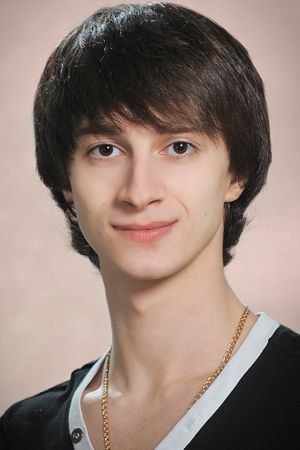
• Honoured Artist of the Republic of North Ossetia-Alania
• Prize-winner at the XII International Ballet and Choreography Competition in Moscow (1st prize, Gold Medal and special prize “For art and stage charm”, 2013)
• Prize-winner at the XII International Ballet Competition Arabesque (2nd prize, special prize for his performance of a contemporary work and the prize “For emotionality and expressiveness”; Perm, 2012)
• Prize-winner at the Yuri Grigorovich World Youth Ballet International Competition (Grand Prix; Sochi, 2012)
• Recipient of the Republic of Tatarstan’s theatre prize Tintin in the category “Best performer in musical theatre” (2013)
From 2000-2005 he trained at the Vaganova Academy of Russian Ballet.
In 2008 he graduated from the Bashkirian College of Dance (class of Nail Sarvarov).
From 2008 to 2013 he was a soloist with the Tatar Academic Musa Jalil Opera and Ballet Theatre, where he appeared in the ballets Swan Lake (Pas de trois), The Sleeping Beauty (Désiré, the Blue Bird), La Bayadère (Golden Idol, Drummer, Indian Dance), Le Corsaire (Isaak Lankedem), The Nutcracker (Prince, choreography by Vasily Vainonen), La Fille mal gardée (Alain, choreography by Oleg Vinogradov), The Arabian Nights (Roc Bird, choreography by Nailja Nazirova), Spartacus (Four Sirtakis) and The Golden Horde (the Spirit of Khan Batu, choreography by Georgy Kovtun).
Joined the Mariinsky Ballet in 2013.
Repertoire includes:
La Sylphide (James, Youths); choreography by August Bournonville, revised version by Elsa-Marianne von Rosen,
Giselle (Classical Duet); choreography by Jean Coralli, Jules Perrot and Marius Petipa,
La Bayadère (Golden Idol); choreography by Marius Petipa, revised version by Vladimir Ponomarev and Vakhtang Chabukiani,
Swan Lake (the Prince’s Friends); choreography by Marius Petipa and Lev Ivanov, revised version by Konstantin Sergeyev,
Le Réveil de Flore (Zéphyr); choreography by Marius Petipa, revival of the 1894 production, staged by Sergei Vikharev,
Le Corsaire (Ali, Lankendem); production by Pyotr Gusev after the composition and choreography by Marius Petipa,
Don Quixote (Basilio); choreography by Alexander Gorsky,
Michel Fokine's ballets Le Carnaval (Harlequin), Pétrouchka (Pétrouchka),
The Fountain of Bakhchisarai (Polish Youths); choreography by Rostislav Zakharov,
The Nutcracker (Nutcracker Prince, Classical Trio); choreography by Vasily Vainonen
Romeo and Juliet (Mercutio, Troubadour); choreography by Leonid Lavrovsky,
George Balanchine’s ballets Symphony in C (IV. Allegro vivace), Jewels (Emeralds), Prodigal Son (the Prodigal), A Midsummer Night’s Dream (Oberon),
Spartacus (Gaul); choreography by Leonid Yakobson,
The Young Lady and the Hooligan (the Hooligan); choreography by Konstantin Boyarsky,
The Legend of Love (Dance of the Jesters); choreography by Yuri Grigorovich,
The Nutcracker (the Nutcracker Prince); production by Mihail Chemiakin, choreography by Kirill Simonov,
and Anna Karenina (Levin); choreography by Alexei Ratmansky,
The Bronze Horseman (Balakirev the Jester); choreography by Yuri Smekalov.
Repertoire also includes:
pas de deux from the ballet Flames of Paris; choreography by Vasily Vainonen
and Intensio (Intensifier); choreography by Yuri Smekalov.
